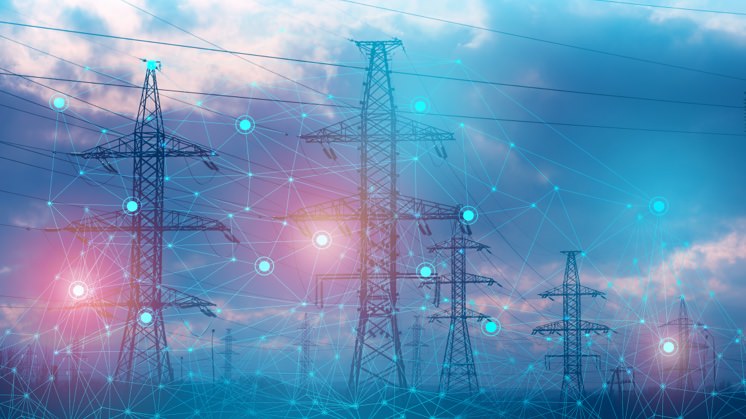Internet of Energy
The future of energy efficiency: the internet of energy
Electrical network Smart Grids
After years in which the Internet of Things has been one of the main drivers of change in the way we consume, now comes the Internet of Energy. Its aim is to automate and regulate processes, enabling greater energy efficiency and a better use of renewable energies.

There is no doubt that the Internet of Things has been one of the revolutions of recent years. Its apparently simple mission was to connect everyday items to the Internet. Thanks to this, significant advances have been made in the automation of processes such as, for example, regulating the temperature, which, in addition to making our lives much simpler, has led to increased efficiency in homes and offices.
Now, these processes have also reached the world of energy thanks to the Internet of Energy (IoE). The ultimate goal is to automate both the transfer and consumption of energy, which in turn will improve the efficiency and use of resources. These improvements would also allow for a greater implementation of renewable energies, as it would be easier for self-consumption, as there would be less need for external energy.
IoE technologies
One of the biggest advances in IoE is the use of Big Data, which makes it possible to analyse everything that happens during the entire process. For example, it allows us to know consumption trends, which can help us to have enough energy ready when the time comes. It also provides real-time information on everything that happens so that any unforeseen events can be dealt with.
In addition, AI (Artificial Intelligence) is also used in plants and development systems. Artificial intelligence, combined with the information provided by smart meters, makes it possible to further optimise energy distribution. The use of smart grids, electricity grids that can intelligently and dynamically integrate the actions of all users connected to them, is presented here as a key point to exploit the full potential of this optimisation. In this way, we are taking another step forward in our commitment to decarbonisation, a process that we at Iberdrola see as fundamental on the road to curbing climate change.
The advantages of the Internet of Energy
The Internet of Energy is so young that its possibilities are virtually endless. However, there is still a long way to go to fully understand how it will help our industry in the future. The current advantages of this system are:
- Reduce inefficiencies during energy transport and distribution
- Allow adaptation to any circumstances that cannot be foreseen or controlled.
- Minimise energy losses leading to lower energy costs
In addition to this reduction in electricity system costs, which in turn can be passed on to customers, there is also the aforementioned benefit of self-consumption, one of our major commitments. An improvement in the storage of renewable energies will make their use more attractive in places where energy transport is more expensive and costly.
The example of China
China is currently one of the world's leading producers of renewable energy, but suffers multiple power outages due to the lack of infrastructure in the country. Something very similar happens in the case of electric vehicles. The country is one of the world's largest car manufacturers, but the local fleet is very small due to the lack of charging points.
The Asian country is the one that is working the most on automation within the structure. In addition, it is increasing the number of energy stores, with the aim of storing energy at times when the system may be overloaded in order to use it at times when levels may fall. Advances in these aspects have allowed the Asian country to improve its energy expenditure per unit produced by 3%.
Personalising customer contact
Iberdrola helps its customers to reduce their energy consumption while maintaining comfort. Thanks to all the data available, we offer each customer a fully personalised service. Giving an individual message to each customer has proved to be the key to success, customers have saved on their consumption, they value this approach and more opportunities are generated. Thanks to the use of complex algorithms, we are able to reach almost 100% of the portfolio, disaggregating their consumption in different appliances, comparing with similar households and personalising their savings and return on investment with the different Smart solutions that will help to make their home more efficient.
Advanced Smart Assistant
In the energy transition towards a lower carbon future, Iberdrola launches the Advanced Smart Assistant, a connected energy solution that enables customers to take an active role in the energy transition. This digital solution allows customers to reduce consumption of smart electric devices by 10-30%.
With this service, Iberdrola customers can connect and control the different electrical solutions in their homes, including air conditioning, domestic hot water and electric vehicle charging management. The platform is designed to shift consumption to the most economical tariff hours, taking into account the availability of power in the home, adapting to the customer's energy needs and comfort, while facilitating electrification and improving the sustainability of the system by seeking the times of greatest renewable production.
In addition, if the customer has solar panels at home, the platform intelligently manages the home's energy consumption, delaying non-urgent energy consumption to the home's peak green production hours, thus improving energy efficiency.
All through a simple experience via the Iberdrola customer App, also offering advanced information and recommendations, allowing consumers to be direct agents in the energy transition and in their own energy use.




